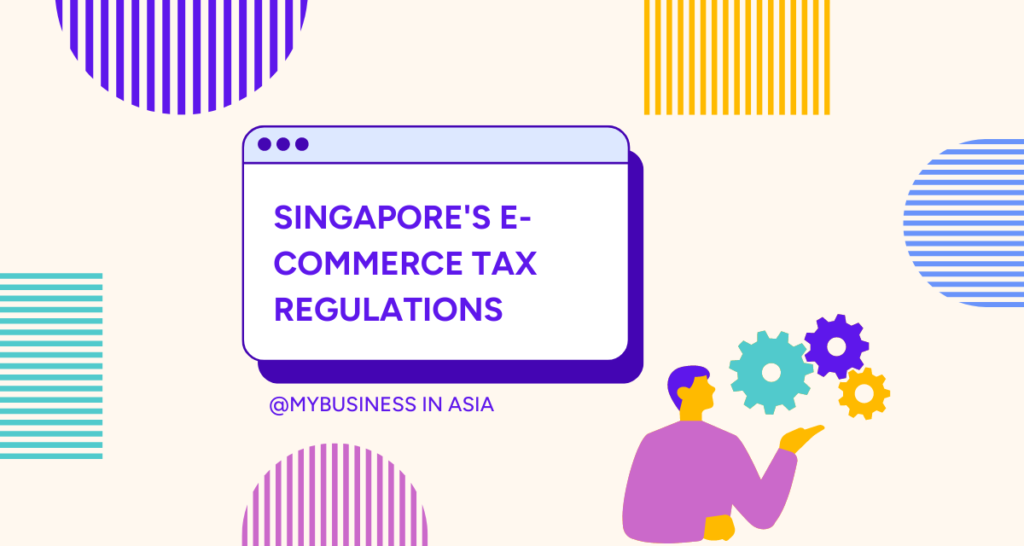
In the rapidly evolving landscape of e-commerce, navigating tax regulations is paramount for businesses striving for success in Singapore’s burgeoning digital economy. As the Asia-Pacific region continues to witness exponential growth in online transactions, understanding the intricacies of Singapore’s e-commerce tax landscape is essential for businesses to remain compliant and competitive. In this comprehensive analysis, MBiA delves into the complexities of Singapore’s e-commerce tax regulations, providing businesses with invaluable insights to navigate the regulatory landscape effectively.
- Introduction: The Rise of E-commerce in Singapore
- Goods and Services Tax (GST) in E-commerce
- Cross-border E-commerce Transactions
- Compliance Challenges and Opportunities
- Conclusion
Introduction: The Rise of E-commerce in Singapore
With the proliferation of digital platforms and the increasing adoption of online shopping, Singapore has emerged as a regional hub for e-commerce. The city-state’s strategic location, robust infrastructure, and tech-savvy population have contributed to the rapid growth of the e-commerce sector. According to recent data, Singapore’s e-commerce market is expected to reach USD 6.63 billion by 2025, driven by factors such as rising internet penetration, changing consumer preferences, and the growing popularity of mobile shopping.
However, amidst this rapid growth, businesses operating in the e-commerce space must navigate a complex regulatory environment, particularly concerning taxation. Singapore’s tax regulations governing e-commerce transactions are multifaceted, encompassing various aspects such as Goods and Services Tax (GST), import duties, and cross-border transactions. Understanding these regulations is crucial for e-commerce businesses to ensure compliance, mitigate risks, and seize opportunities for growth.
Goods and Services Tax (GST) in E-commerce
One of the key considerations for e-commerce businesses in Singapore is the applicability of Goods and Services Tax (GST) on their transactions. Under Singapore’s GST regime, goods and services supplied in Singapore are generally subject to GST at a standard rate of 9%. This includes goods and services sold through e-commerce platforms, regardless of whether the seller is based locally or overseas.
For e-commerce businesses operating in Singapore, compliance with GST regulations involves several key steps:
1. GST Registration: E-commerce businesses that exceed the GST registration threshold must register for GST with the Inland Revenue Authority of Singapore (IRAS). The current GST registration threshold is SGD 1 million in annual taxable turnover.
2. GST Collection and Reporting: Registered e-commerce businesses are required to charge GST on taxable supplies made to customers in Singapore. This includes both goods and services sold through online channels. Additionally, registered businesses must file GST returns with IRAS on a regular basis and remit the GST collected to the tax authorities.
3. Import GST: In addition to GST on domestic transactions, e-commerce businesses may also be liable for import GST on goods imported into Singapore. Import GST is payable at the point of importation and is generally collected by Singapore Customs.
Cross-border E-commerce Transactions
In an increasingly globalized marketplace, cross-border e-commerce transactions have become commonplace, presenting both opportunities and challenges for businesses. Singapore’s tax regulations governing cross-border e-commerce transactions are designed to ensure a level playing field for domestic and overseas sellers while facilitating international trade and commerce.
Key considerations for cross-border e-commerce transactions in Singapore include:
1. Customs Duties and Taxes: Goods imported into Singapore are subject to customs duties and taxes, including GST and/or duty, depending on the nature and value of the goods. E-commerce businesses involved in cross-border transactions must familiarize themselves with Singapore’s customs regulations and ensure compliance with applicable duties and taxes.
2. Low-Value Goods (LVG) Relief: To facilitate the importation of low-value goods, Singapore has implemented LVG relief, which exempts goods with a total value not exceeding SGD 400 from GST. However, LVG relief is subject to certain conditions and does not apply to certain categories of goods, such as alcohol, tobacco, and controlled goods.
3. Overseas Vendor Registration (OVR): In a bid to level the playing field between local and overseas vendors, Singapore has introduced the Overseas Vendor Registration (OVR) regime. Under this regime, overseas vendors that make significant supplies of digital services to customers in Singapore are required to register for GST and charge GST on their sales.
Compliance Challenges and Opportunities
While Singapore’s e-commerce tax regulations are designed to promote fairness and transparency in the digital economy, they also present challenges for businesses, particularly small and medium-sized enterprises (SMEs) and startups. Compliance with complex tax rules, GST registration requirements, and cross-border tax obligations can be daunting for businesses with limited resources and expertise.
However, amidst these challenges lie opportunities for businesses to streamline their operations, enhance their competitive advantage, and drive growth. By leveraging technology, automation, and expert guidance, e-commerce businesses can optimize their tax compliance processes, minimize risks, and capitalize on emerging opportunities in the digital economy.
Conclusion
In conclusion, navigating Singapore’s e-commerce tax regulations requires a comprehensive understanding of GST requirements, cross-border transaction rules, and compliance obligations. MBiA provides businesses with the expertise, insights, and resources needed to navigate the complex regulatory landscape effectively and capitalize on the opportunities presented by Singapore’s burgeoning e-commerce market.
With our in-depth analysis and strategic guidance, e-commerce businesses can ensure compliance, mitigate risks, and unlock the full potential of Singapore’s dynamic digital economy. Trust MBiA to be your partner in navigating the complexities of e-commerce taxation and achieving sustainable growth and success in Singapore’s competitive marketplace.
If you appreciate this content, you might be interested in our other articles:
- Navigating AI and Personal Data: Singapore PDPC Proposed Advisory Guidelines
- You need to prepare the GST rate change of 2024 now!
- 3 Reasons Why Regular Bookkeeping is Beneficial for your Company
- Payroll services Singapore
- The Best Reasons to Incorporate a Holding Company in Singapore
